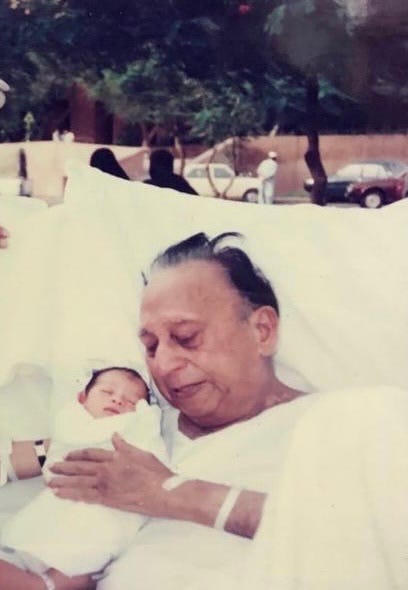#64: Digitally Immortal: Crafting with AI.
Leaving behind more than memories—leaving yourself.
What if You Could Meet The People You’ve Lost?
What if you could sit across from them, hear their voice, see them smile, ask them the questions you never got to?
My grandfather passed away right after I was born. I never met him, but I’ve spent my whole life hearing how brilliant he was—a maestro in math, a mind ahead of his time, someone who would’ve loved today’s technology.
I’ve always wondered what it would’ve been like to talk to him, even once.
That question—what if you could connect with someone long after they’re gone—is where this whole idea started.
Not as science fiction, but as something AI is actually making possible:
Digital Immortality
To me, it’s like preserving art—but the medium is you:
Your voice.
Your face.
Your memories.
Your personality.
I’m not going as far as freezing you in time but I’m thinking of weaving a virtual echo of your soul (your unique way of thinking, speaking, being) into a form that future generations can actively engage with. It’s essential you are in a virtual form being preserved (with all your memories and unique attributes) allowing future generations to connect with you, long after you’ve left this earth.
How Would I Build It Today?
A few tools I would leverage or possibly agentic workflow might be useful here – but let’s focus on tools first which focus on building a living portrait.
Technologies such as Crew.ai, Gemini, ChatGPT, Grok, ElevenLabs, and HeyGen already lay the foundation, what will be challenging is integrating attributes and memories.
Here’s a quick look at how these tools fit into the digital immortality puzzle
Crew.ai: Think of Crew as the behind-the-scenes operator. It connects tools, organizes data, and ensures everything flows—from voice samples and videos to old tweets and memories. It’s what quietly pulls your digital self together.
Gemini: This model handles memory like a beast. It can absorb years of your texts, emails, and convos, then recall them with nuance. The result? A version of you that remembers your childhood takes and niche opinions—like it actually knowsyou.
ChatGPT: This one brings the vibe. It makes your digital self talk like you—not robotic, but warm, casual, sometimes funny. Think: a coffee chat, not a lecture.
Grok: Grok digs into your personality. It gets your tone, your sarcasm, how you rant or explain things. It gives your digital self character—not just content.
ElevenLabs: Voice matters. This tool nails yours, capturing how you sound, laugh, pause. One short clip and it recreates that familiar tone everyone remembers.
HeyGen: This is the face of it all—literally. HeyGen animates your avatar so people can see you speak, smile, nod. Not just audio or text. You, brought back visually.
Attributes and Memories
Once you take care of the look and sound part – it needs the core aspect, which is personality and life experience to truly be you. Now this seems to be a deep-layer question or discovery required but based on how I’m thinking are the following:
Mimic Your Attributes
To make your digital self truly you, it needs to learn how you think, talk, and react. One approach could be spending 30 days interacting with your digital twin, training it like a companion. Feed it your thoughts, your responses, your worldview.
Pull in your social media, texts, journal entries—even home videos. Models like ChatGPT and Gemini could analyze patterns and mimic your communication style over time.
Memory Bank
Your life’s stories deserve structure. Think of building a memory bank—tagging key moments like “graduation,” “first job,” or “rainy hike in Iceland.” Each memory carries not just facts, but emotion.
Crew.ai could organize this data. Language models could retrieve and retell your stories in context. Every memory gets labeled—“thrilled,” “nervous,” “pissed off.” Sentiment analysis helps capture emotional texture, not just information.
Memories could be tied to cues. Ask about summer, and your digital self recalls the beach—because “sand” and “sun” are linked to laughter and nostalgia. With structure and emotional metadata, your digital self won’t just recall stories—it will relive them.
A New Kind of Legacy
This is truly possible – where you can preserve your legacy (wisdom, humor, personality) something future generations can leverage to build and connect to their roots with living connections.
The Human Side
There’s a quiet comfort in this idea—imagine your loved ones being able to hear your voice or see your smile again. It doesn’t erase the pain of loss, but it softens it. It creates presence where there would’ve been only absence.
And beyond grief, capturing the full complexity of a human in digital form could lead to breakthroughs—in memory, storytelling, even empathy.
Yes, Ethics Will Be Questioned!
If you’re reading this and wondering about the ethical implications—yeah, me too. I don’t have all the answers. Same goes for the emotional risks. But isn’t that the case with every frontier?
New Horizon
To me, this is a bridge between tech and something deeply human: the timeless urge to endure. The future has to be something we’re excited about—not just a list of problems to solve.
So what do you think—would you want a digital version of yourself to live on?




